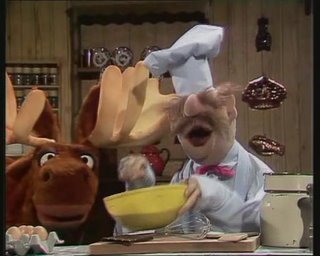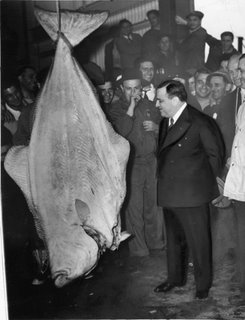
Friday, October 27, 2006
TRJ: Smorgasbord
Totat Request Jive, or TRJ for short, is a weekly Friday feature where you the WordHumper reader decide which lucky word gets humped back to the stoneage (or at least to Proto-Indo-Europa). Today's word comes from CH (again, c'mon people--we need more entries) in Brooklyn who writes: An excellent choice, Caroline...er...CH from Brooklyn. Smorgasbord, smörgåsbord in Swedish (I wish English would leave in umlaut and ring diacritics. They make words much more interesting to look at.), describes a sort of buffet; or, more generically, a varied collection of anything. Smörgås on its own is a slice of bread with butter. The word smör comes to us from Old Norse and means butter; it's a cognate of our English noun smear. Gås is a Swedish dialectal word meaning "lump of butter" and if from the Old Norse gās, goose. Gās gave English its word for a young goose, gosling. Bord, also from Old Norse, is a table and is a cognate of our word board. Der.
An excellent choice, Caroline...er...CH from Brooklyn. Smorgasbord, smörgåsbord in Swedish (I wish English would leave in umlaut and ring diacritics. They make words much more interesting to look at.), describes a sort of buffet; or, more generically, a varied collection of anything. Smörgås on its own is a slice of bread with butter. The word smör comes to us from Old Norse and means butter; it's a cognate of our English noun smear. Gås is a Swedish dialectal word meaning "lump of butter" and if from the Old Norse gās, goose. Gās gave English its word for a young goose, gosling. Bord, also from Old Norse, is a table and is a cognate of our word board. Der.
Okay, I know your next question--why do the Swedes use the same word for goose and lump of butter? I did some research and found a few theories, all listed on the American Dialectal Society mailing list, circa July 2001.
If you have a word you'd like humped because you're either too lazy or inept to do it yourself please email it, along with your location, to wordhumper. And in case you missed the TRJ from two weeks ago check out Hallucinations. See you Monday!
I have a TRJ for you, "smorgasboard"...saw it on the Weather Channel this morning and I thought I'd mention it.
 An excellent choice, Caroline...er...CH from Brooklyn. Smorgasbord, smörgåsbord in Swedish (I wish English would leave in umlaut and ring diacritics. They make words much more interesting to look at.), describes a sort of buffet; or, more generically, a varied collection of anything. Smörgås on its own is a slice of bread with butter. The word smör comes to us from Old Norse and means butter; it's a cognate of our English noun smear. Gås is a Swedish dialectal word meaning "lump of butter" and if from the Old Norse gās, goose. Gās gave English its word for a young goose, gosling. Bord, also from Old Norse, is a table and is a cognate of our word board. Der.
An excellent choice, Caroline...er...CH from Brooklyn. Smorgasbord, smörgåsbord in Swedish (I wish English would leave in umlaut and ring diacritics. They make words much more interesting to look at.), describes a sort of buffet; or, more generically, a varied collection of anything. Smörgås on its own is a slice of bread with butter. The word smör comes to us from Old Norse and means butter; it's a cognate of our English noun smear. Gås is a Swedish dialectal word meaning "lump of butter" and if from the Old Norse gās, goose. Gās gave English its word for a young goose, gosling. Bord, also from Old Norse, is a table and is a cognate of our word board. Der.Okay, I know your next question--why do the Swedes use the same word for goose and lump of butter? I did some research and found a few theories, all listed on the American Dialectal Society mailing list, circa July 2001.
...the etymology of the word is not 100% certain,or
but apparently it was first used to describe the butter clumps that (as geese) float on the butter milk when one churns butter.
The origin of gås is indeed goose, but smörgås is to be interpreted as goose fat used as a spread ("smear") for bread. Today, of course, the spread is likely not to be goose fat but dairy-based...or
I was always under the impression that the word smörgås was meant to mean "butter goose," in which the open-faced sandwich looks like a goose because the toppings are piled so high. So I'm speculating that it has less to do with goose fat than with a goose shape.The goose-fat theory seems the most credible to me; afterall the Swedes eat some nasty stuff. Seriously, have you ever been to a country that has as many foods available in tube-form? Gross.
If you have a word you'd like humped because you're either too lazy or inept to do it yourself please email it, along with your location, to wordhumper. And in case you missed the TRJ from two weeks ago check out Hallucinations. See you Monday!
Monday, October 16, 2006
TRJ: Hallucinations
Totat Request Jive, or TRJ for short, is a weekly Friday feature where you the WordHumper reader decide which lucky word gets humped back to the stoneage (or at least to Proto-Indo-Europa). Alas, my roof was in danger of caving in this past Friday, so last week's TRJ was postponed until this morning. Today's word comes from RM in Walnut Creek who asks where the word hallucinate comes from.
Hallucinate is from a Latin root, hallūcinārī, hallūcināt- which means to dream or to be deceived. This verb, in turn, is a variant of ālūcinārī, meaning "to wander in the mind, talk idly, prate". The Online Etymology Dictionary adds: At least one person, Leo Rutherford, has the misconception that "'hallucinogenic' comes from the word 'hallowed'" and used this false etymology to bolster his justification for the use of hallucinogenic drugs in religious ritual. Mark Liberman at the Language Log did a nice job debunking this idea noting that the words do not share a common root, however halibut and hallow do (both are from the Indo-European root kailo meaning "whole, uninjured, of good omen"). Thus by Rutherford's logic he is
At least one person, Leo Rutherford, has the misconception that "'hallucinogenic' comes from the word 'hallowed'" and used this false etymology to bolster his justification for the use of hallucinogenic drugs in religious ritual. Mark Liberman at the Language Log did a nice job debunking this idea noting that the words do not share a common root, however halibut and hallow do (both are from the Indo-European root kailo meaning "whole, uninjured, of good omen"). Thus by Rutherford's logic he is
If you have a word you'd like humped because you're either too lazy or inept to do it yourself please email it, along with your location, to wordhumper. And in case you missed last week's TRJ check out Antonomasia.
hallucinate [OED]
Hallucinate is from a Latin root, hallūcinārī, hallūcināt- which means to dream or to be deceived. This verb, in turn, is a variant of ālūcinārī, meaning "to wander in the mind, talk idly, prate". The Online Etymology Dictionary adds:
...probably from Gk. alyein, Attic halyein "be distraught," probably related to alasthai "wander about." The L. ending probably was influenced by vaticinari "to prophecy," also "to rave." Sense of "to have illusions" is from 1652. Hallucination in the pathological/psychological sense of "seeing or hearing something which is not there" is first recorded 1646; distinct from illusion in not necessarily involving a false belief. Hallucinogen "drug which induces hallucinations" is first recorded 1954; hallucinogenic (adj.) in this sense is from 1952.
 At least one person, Leo Rutherford, has the misconception that "'hallucinogenic' comes from the word 'hallowed'" and used this false etymology to bolster his justification for the use of hallucinogenic drugs in religious ritual. Mark Liberman at the Language Log did a nice job debunking this idea noting that the words do not share a common root, however halibut and hallow do (both are from the Indo-European root kailo meaning "whole, uninjured, of good omen"). Thus by Rutherford's logic he is
At least one person, Leo Rutherford, has the misconception that "'hallucinogenic' comes from the word 'hallowed'" and used this false etymology to bolster his justification for the use of hallucinogenic drugs in religious ritual. Mark Liberman at the Language Log did a nice job debunking this idea noting that the words do not share a common root, however halibut and hallow do (both are from the Indo-European root kailo meaning "whole, uninjured, of good omen"). Thus by Rutherford's logic he is ...correct in supporting the use of halibut in religious rituals, but for magic mushrooms he'll have to look to other arguments.As for the photo on the right, you're not hallucinating; that's Fiorello LaGuardia inspecting a 300-pound halibut.
If you have a word you'd like humped because you're either too lazy or inept to do it yourself please email it, along with your location, to wordhumper. And in case you missed last week's TRJ check out Antonomasia.
hallucinate [OED]
Friday, October 06, 2006
TRJ: Antonomasia
Totat Request Jive, or TRJ fo' short, is a weekly Friday feature where you the WordHumper reader decide which lucky word gets humped back to the stoneage (or at least to Proto-Indo-Europa). Today's word comes from JG in Manhattan who writes:
Antonomasia comes from a Greek word, antonomazein (not to be confused with Abu Mazen), meaning "to name differently". JG, I don't want to belittle your initial hump attempt with patronizing hooey because you did a really really swell job even though you were laughably off the mark--I'm sure you'll do just great next time. I say it time and time again: It's best to leave the serious humping to the professional humpers (which would be me): case in point, the anto- is actually the *same* as anti-, in this case taking on the sense of "instead of", while onomazein comes from the Greek onoma, meaning "name" (okay, I take back my patronizing hooey, you got the nom right). And although you're free to masticate while humping (and sometimes after humping), antonomasia itself has nothing to do with chewing (you did mean chewing, right?).
Per Wikipedia:

THE WORD IS 'ANTONOMASIA'. so you've got anto, which might mean 'same' since it' not 'anti' and 'nom' wich is obviously 'name and 'masia' feels like 'masticating' so that means 'said'? or 'feel in mouth'?'same name said'? 'same name feel in mouth'? woah i'm tired. have fun humping....!JG, I *always* have fun humping, especially things I've never heard of. Let's hump to it--
Antonomasia comes from a Greek word, antonomazein (not to be confused with Abu Mazen), meaning "to name differently". JG, I don't want to belittle your initial hump attempt with patronizing hooey because you did a really really swell job even though you were laughably off the mark--I'm sure you'll do just great next time. I say it time and time again: It's best to leave the serious humping to the professional humpers (which would be me): case in point, the anto- is actually the *same* as anti-, in this case taking on the sense of "instead of", while onomazein comes from the Greek onoma, meaning "name" (okay, I take back my patronizing hooey, you got the nom right). And although you're free to masticate while humping (and sometimes after humping), antonomasia itself has nothing to do with chewing (you did mean chewing, right?).
Per Wikipedia:
Antonomasia is a rhetoric device: the substitution of any epithet or phrase for a proper name; the opposite substitution of a proper name for some generic term is also sometimes called antonomasia.Example: "I'm oozing puss, please hand me a Kleenex"--of course, I don't care what brand of facial tissue you give me, it's just that Kleenex is understood to represent the generic class of tissues. Likewise, traitors are Benedict Arnolds, The Gipper is Ronald Reagan, Il Duce is Mussolini, my mom has a few choice antonomastic phrases for my dad, and the most classic example, again per Wikipedia:

A contemporary example of an antonomastic usage occurs in the phrase "He's such a Nimrod!", substituting the fearless hunter's name—who isn't portrayed as being particularly idiotic—for "idiot" or "jerk", a usage that has been made popular by the 1940s Bugs Bunny cartoons, in which Bugs Bunny frequently refers to Elmer Fudd (who keeps hunting the hare without success) sarcastically as "poor little Nimrod".If you have a word you'd like humped because you're either too lazy or inept to do it yourself please email it, along with your location, to wordhumper. And in case you missed last week's TRJ check out Cuckoo For Cuckold Puffs. See you Monday!
Friday, September 29, 2006
TRJ: Cuckoo for Cuckold Puffs
Alternate title: One Flew Over the Cuckold's Nest
Today's special in the history of WordHumper because we're inaugurating "Total Request Jive" or "TRJ" for short. This will be a weekly Friday feature where you the WordHumper reader decide which lucky word gets humped back to the stoneage (or at least to Proto-Indo-Europa). And today's word comes to us from CH in Brooklyn who IMs:
CH: i want you to hump "cuckold"
CH: i bet it's dirty
 I accept your challenge, CH! Cuckold goes back to the Old French word for the cuckoo bird. Because it's Friday and I'm lazy and the research has already been done let's go right to the blockquote from American Heritage.
I accept your challenge, CH! Cuckold goes back to the Old French word for the cuckoo bird. Because it's Friday and I'm lazy and the research has already been done let's go right to the blockquote from American Heritage.
 It should be noted that although cuckold does have a rather negative connotation not all men who suffered this fate were necessarily unhappy. In fact a wittol is a man who doesn't mind that his wife is servicing the neighborhood. This comes from the Middle English wetewold, which is composed of the verb weten (to know), and (coke)wold, which, as we saw above means cuckold. The most famous of wittols is likely Sir William Hamilton (left) whose wife Emma became the lover of Horatio Nelson.
It should be noted that although cuckold does have a rather negative connotation not all men who suffered this fate were necessarily unhappy. In fact a wittol is a man who doesn't mind that his wife is servicing the neighborhood. This comes from the Middle English wetewold, which is composed of the verb weten (to know), and (coke)wold, which, as we saw above means cuckold. The most famous of wittols is likely Sir William Hamilton (left) whose wife Emma became the lover of Horatio Nelson.
On a side note, the Middle English weten is also responsible for our Modern English word wit. And in case you're wondering how cuckoo came to mean a foolish or crazy person, I'm sorry to say sources are vague at best. The OED simply notes that a person is called cuckoo in reference to the "bird's monotonous call."
wittol [American Heritage]
wit [American Heritage]
wittol [OED]
cuckold [OED]
cuckoo [OED]
cuckold [Wikipedia]
cuckoo [Wikipedia]
William Hamilton [Wikipedia]
Today's special in the history of WordHumper because we're inaugurating "Total Request Jive" or "TRJ" for short. This will be a weekly Friday feature where you the WordHumper reader decide which lucky word gets humped back to the stoneage (or at least to Proto-Indo-Europa). And today's word comes to us from CH in Brooklyn who IMs:
CH: i want you to hump "cuckold"
CH: i bet it's dirty
 I accept your challenge, CH! Cuckold goes back to the Old French word for the cuckoo bird. Because it's Friday and I'm lazy and the research has already been done let's go right to the blockquote from American Heritage.
I accept your challenge, CH! Cuckold goes back to the Old French word for the cuckoo bird. Because it's Friday and I'm lazy and the research has already been done let's go right to the blockquote from American Heritage. The female of some Old World cuckoos lays its eggs in the nests of other birds, leaving them to be cared for by the resident nesters. This parasitic tendency has given the female bird a figurative reputation for unfaithfulness as well. Hence in Old French we find the word cucuault, composed of cocu, “cuckoo, cuckold,” and the pejorative suffix –ald and used to designate a husband whose wife has wandered afield like the female cuckoo. An earlier assumed form of the Old French word was borrowed into Middle English by way of Anglo-Norman. Middle English cokewold, the ancestor of Modern English cuckold, is first recorded in a work written around 1250.The OED adds that in German cuckold
...applied to the adulterer as well as the husband of the adulteress, and Littré cites an assertion of the same double use in French; in English, where cuckold has never been the name of the bird, we do not find it applied to the adulterer.You may have heard that cuckolds are sometimes "wearing the horns"--if you're into egregious acts of humiliation you'll be happy to learn that this refers to an apocryphal tradition that claims in some European villages when a wife gives birth to a child recognizably not his own a parade is held "...in which the hapless husband is forced to wear antlers on his head as a symbol of his wife’s infidelity". Ouch.
 It should be noted that although cuckold does have a rather negative connotation not all men who suffered this fate were necessarily unhappy. In fact a wittol is a man who doesn't mind that his wife is servicing the neighborhood. This comes from the Middle English wetewold, which is composed of the verb weten (to know), and (coke)wold, which, as we saw above means cuckold. The most famous of wittols is likely Sir William Hamilton (left) whose wife Emma became the lover of Horatio Nelson.
It should be noted that although cuckold does have a rather negative connotation not all men who suffered this fate were necessarily unhappy. In fact a wittol is a man who doesn't mind that his wife is servicing the neighborhood. This comes from the Middle English wetewold, which is composed of the verb weten (to know), and (coke)wold, which, as we saw above means cuckold. The most famous of wittols is likely Sir William Hamilton (left) whose wife Emma became the lover of Horatio Nelson.On a side note, the Middle English weten is also responsible for our Modern English word wit. And in case you're wondering how cuckoo came to mean a foolish or crazy person, I'm sorry to say sources are vague at best. The OED simply notes that a person is called cuckoo in reference to the "bird's monotonous call."
wittol [American Heritage]
wit [American Heritage]
wittol [OED]
cuckold [OED]
cuckoo [OED]
cuckold [Wikipedia]
cuckoo [Wikipedia]
William Hamilton [Wikipedia]
Labels: Anglo-Norman, Middle English, Old French, TRJ